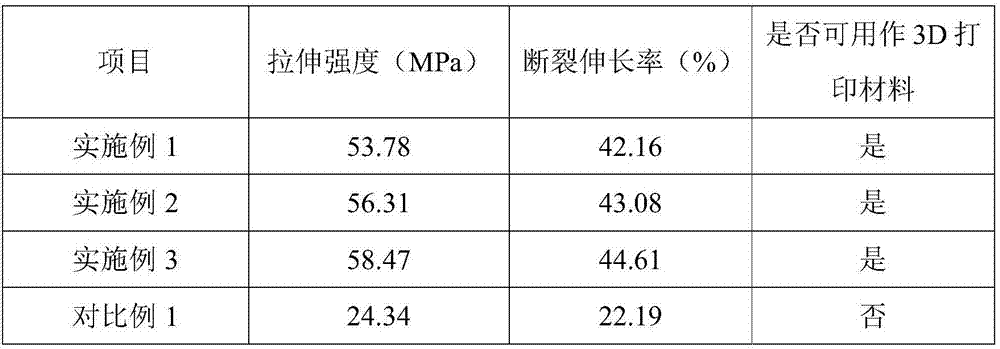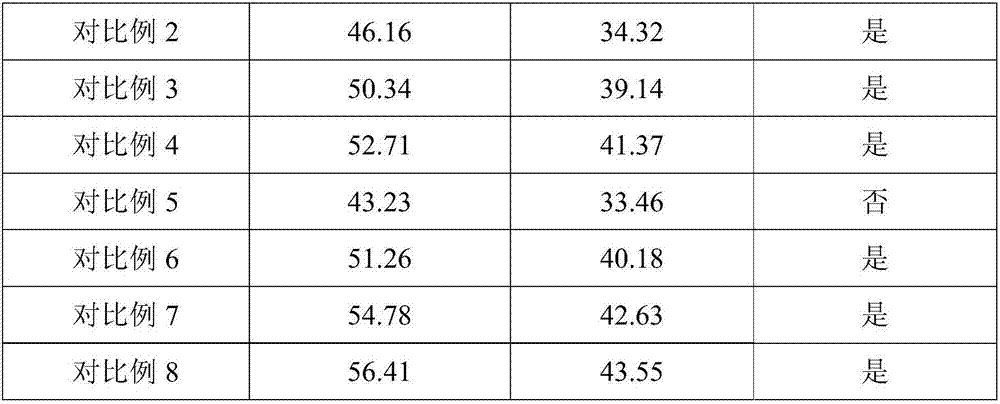Environment-friendly composite material and application thereof
A composite material, environmentally friendly technology, applied in the direction of additive processing, can solve the problem of waste of banana stalk resources, and achieve the effect of increasing added value, excellent tensile strength and elongation at break, and expanding the scope of application
- Summary
- Abstract
- Description
- Claims
- Application Information
AI Technical Summary
Problems solved by technology
Method used
Image
Examples
Embodiment 1
[0063] An environmentally friendly composite material, in parts by weight, comprising the following raw materials: 158 parts of banana stalks, 59 parts of polylactic acid, 34 parts of sodium tripolyphosphate, 1 part of graphene, 0.4 parts of fatty alcohol polyoxyethylene ether ammonium sulfate, composite 4 parts of agent A, 3.1 parts of compound agent B;
[0064] The composite agent A includes the following raw materials in parts by weight: 6 parts of ACR foam regulator, 4 parts of aerosol generating agent, 3 parts of coupling agent kh-550, 2 parts of fatty acid glyceride, modified polyacrylate 4.2 parts, 2 parts of bis(2-ethylhexyl) phthalate, 3 parts of antioxidant 1010, 4 parts of polyaluminum chloride;
[0065] The compounding agent B is in parts by weight and includes the following raw materials: 152 parts of tapioca starch, 18 parts of dimethyl phosphite, N-ethyl-5-methyl-2-(1-methylethyl)cyclohexyl 6 parts of formamide, 7 parts of epibromopropane, 1.8 parts of carbonam...
Embodiment 2
[0082] An environmentally friendly composite material, in parts by weight, comprising the following raw materials: 182 parts of banana stalks, 64 parts of polylactic acid, 42 parts of sodium tripolyphosphate, 1.6 parts of graphene, 0.5 parts of fatty alcohol polyoxyethylene ether ammonium sulfate, composite 6 parts of agent A, 4 parts of compound agent B;
[0083] The composite agent A includes the following raw materials in parts by weight: 9 parts of ACR foam regulator, 5 parts of aerosol generating agent, 4 parts of coupling agent kh-550, 3 parts of fatty acid glyceride, modified polyacrylate 5.2 parts, 3 parts of bis(2-ethylhexyl) phthalate, 4 parts of antioxidant 1010, 5 parts of polyaluminum chloride;
[0084] The compounding agent B is in parts by weight and includes the following raw materials: 165 parts of tapioca starch, 20 parts of dimethyl phosphite, N-ethyl-5-methyl-2-(1-methylethyl)cyclohexyl 8 parts of formamide, 9 parts of epibromopropane, 2.5 parts of carbona...
Embodiment 3
[0101] An environmentally friendly composite material, in parts by weight, comprising the following raw materials: 200 parts of banana stalks, 71 parts of polylactic acid, 50 parts of sodium tripolyphosphate, 2 parts of graphene, 0.6 parts of fatty alcohol polyoxyethylene ether ammonium sulfate, composite 8 parts of agent A, 5 parts of compound agent B;
[0102] The composite agent A includes the following raw materials in parts by weight: 10 parts of ACR foam regulator, 6 parts of aerosol generating agent, 5 parts of coupling agent kh-550, 4 parts of fatty acid glyceride, modified polyacrylate 6 parts, 4 parts of bis (2-ethylhexyl) phthalate, 5 parts of antioxidant 1010, 6 parts of polyaluminum chloride;
[0103] The compounding agent B is in parts by weight and includes the following raw materials: 182 parts of tapioca starch, 22 parts of dimethyl phosphite, N-ethyl-5-methyl-2-(1-methylethyl)cyclohexyl 10 parts of formamide, 10 parts of epibromopropane, 4.2 parts of carbona...
PUM
 Login to View More
Login to View More Abstract
Description
Claims
Application Information
 Login to View More
Login to View More - R&D
- Intellectual Property
- Life Sciences
- Materials
- Tech Scout
- Unparalleled Data Quality
- Higher Quality Content
- 60% Fewer Hallucinations
Browse by: Latest US Patents, China's latest patents, Technical Efficacy Thesaurus, Application Domain, Technology Topic, Popular Technical Reports.
© 2025 PatSnap. All rights reserved.Legal|Privacy policy|Modern Slavery Act Transparency Statement|Sitemap|About US| Contact US: help@patsnap.com


